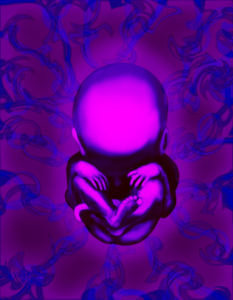
Spend any time in New Age circles and you’ll probably hear about “indigo children.” This term often describes empathetic, strong-willed kids who eschew conformity, with some claiming that they also possess supernatural gifts. While believers insist that youth with these qualities are the next step in human evolution, some skeptics maintain that such traits can be present in neurodivergent children. Unpacking the concept and the debate surrounding it proves to be both fascinating and enlightening.
Defining Indigo Children
The left-wing online encyclopedia RationalWiki reveals that New Age thinker Nancy Ann Tappe first coined the term “indigo children” in the 1970s. First, Tappe claimed that these kids are surrounded by an indigo-hued aura. In her book “Understanding Your Life Through Color,” she then argued that they account for up to 95 percent of the world’s total population of children and teenagers.
RationalWiki divulges that the idea was further developed by authors Lee Carroll and Jan Tober, who published their book “The Indigo Children: The New Kids Have Arrived” in 1999. Carroll and Tober assert that the label applies to kids who display several unique traits:
- A healthy self-esteem that can be misconstrued as entitlement or arrogance
- Introverted tendencies to the point of being seen as antisocial
- Rejection of authority for its own sake and guilt-based discipline
- Opposition to conformity and rigid, ritualistic systems
- Greater-than-average intelligence
- Difficulty with impulse control
Tappe, Carroll, and Tober believe that these children are the key to advancing humanity into a better age. In “Understanding Your Life Through Color,” Tappe argues that they are “sensitive, gifted souls with an evolved consciousness” whose goal is to “create one land, one globe and one species.”
Skeptics’ Responses to the Concept
While the idea of indigo children gained some ground in the early 2000s, many detractors contend that there are scientific and behavioral explanations for their traits. In one chapter of a 2014 book titled “Contemporary Esotericism,” Vancouver-based clinical counselor Daniel Kline maintains that the belief is rooted in religious ideas that reject scientific truths. Kline argues that many kids who are given this label are autistic or display characteristics that meet the criteria for a diagnosis of Attention Deficit and Hyperactivity Disorder.
If Kline is correct, some adults may prefer to think of these kids as “indigo children” because they view alternative types of human neurology in a negative light. Stereotypes about autistic people characterize them as lacking creativity, empathy, and emotion. Those with ADHD, some of whom refer to themselves as possessing “interest-based” nervous systems, are frequently labeled as lazy, sloppy, and undisciplined. Additionally, even major experts disagree on how to best help them, with some insisting that they need a cure while plenty of scammers concoct dangerous “treatments” that can cause serious harm or death. Meanwhile, neurodivergent educator and California Institute of Integral Studies professor Nick Walker points out that such neurocognitive styles can result from a brain that “functions in ways that diverge significantly from the dominant societal standards of ‘normal.’” According to Walker, they are simply neurological variants that exist within the broad diversity of human experience.
The Debates Continue
The “indigo children” concept enjoyed its heyday in the mid-2000s, but it’s still discussed by both believers and skeptics today. Noticing intersections between Tappe’s original ideas and many traits demonstrated by neurodivergent people, some caution against the possible associated risks of rejecting scientific thought. Others also challenge traditional medicalized views toward neurodivergent characteristics, regarding them as natural neurological variations in the human species. Whether these “indigos” are the next step in human evolution remains to be seen, but neurodivergent individuals face a very real battle in the here and now: stereotypes that stand in the way of fulfilling lives and basic civil rights.

